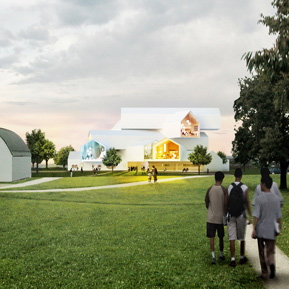Construction work is due to start in September on VitraHaus, a new showroom at the Vitra Campus at Weil am Rhein in Germany.
Designed by architects Herzog & de Meuron, it will be the latest architectural addition at the furniture brand's extensive HQ complex, which already features buildings by Frank Gehry, Zaha Hadid, Tadao Ando and more (see aerial montage above; VitraHaus appears bottom right).
Herzog & de Meuron, who are located in nearby Basel, have based their design on the local standard house typology extruded and stacked in an irregular pile. Below is a photo of the model we took at the Vitra Campus last month.
Renderings and text are © Herzog & de Meuron.
>> see our earlier posts about the exhibitions at the Vitra Campus during the Art Basel and Design Miami/Basel fairs last month: Vitra Edition 2007; MyHome at Vitra Campus; Vitra Campus Party; New photos of Vitra Edition 2007.
Below is a project description provided by Herzog & de Meuron:
--
No. 294
VitraHaus
Weil am Rhein, Germany
2006 –, planned completion 2009
Over the past few years Vitra has aquired a wide-ranging Home Collection. The quantity and variety of objects by many different designers led to the idea of building a showroom to present the items to the public. There would also be additional space to be used as an exhibition venue for selected parts of the collection or even as an extension of the Vitra Museum itself. A shop, a cafe linked to the outside and conference rooms complete the program.
The “VitraHaus“ is a direct, architectural rendition of the ur-type of house, as found in the immediate vicinity of Vitra and, indeed, all over the world. The products that will be on display are designed primarily for the private home and, as such, should not be presented in the neutral atmosphere of the conventional hall or museum but rather in an environment suited to their character and use.
By stacking, extruding and pressing – mechanical procedures used in industrial production – simply shaped houses become complex configurations in space, where outside and inside merge. The interior is designed as a spatial sequence with surprising transitions and views of the landscape. The landscape in all its variety – the idyllic Tüllinger Hills, the broad expanse of the railroad tracks, and the urbanized plane of the Rhine – was the incentive to design a building that concentrates on the vertical. In contrast to the other buildings on the Vitra Campus, an essential component of the design involved drawing the outdoors inside.
The anticipated increase in visitors – not only individuals but also many schools and other groups – gave added importance to benches, niches, covered waiting zones and entries. These areas for sitting, standing, waiting, and looking are stamped or cut out of the shape of the houses through simple mechanical manipulations. Given the large number of design objects on view inside, all of these areas are conceived as an integral part of the architecture and not as self-contained objects.
Herzog & de Meuron, 2006
Translation by Catherine Schelbert

